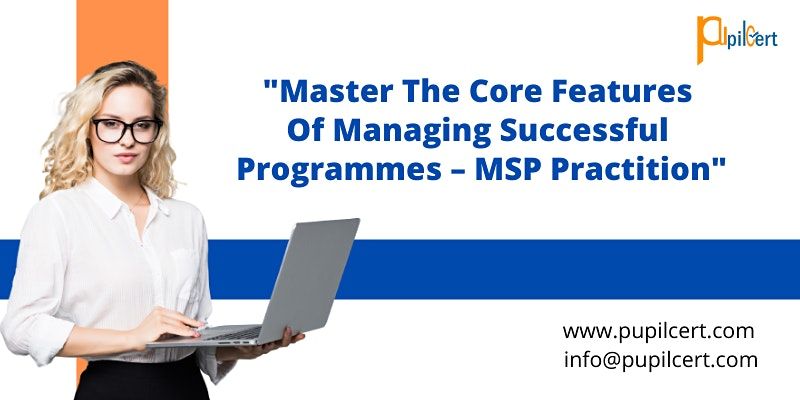
For more info, reach us at [email protected]
About this Event
Course Description:
The Managing Successful Programmes (MSP®) Practitioner Course provides an opportunity to learn how MSP can be applied to real live programmes and it prepares participants for the MSP Practitioner examination.
This level aims to confirm that a candidate has sufficient knowledge and understanding of the MSP guidance to act as an informed member of a programme management team. That is, someone responsible for managing, leading, supporting or advising on work within an MSP environment.
The course is entirely focused at applying MSP in programme scenarios. Exercises will be based on the participant’s own experience, and a case study with a similar format used in the APM Group Practitioner Exam. This case study will be used to test the thorough understanding of the application of MSP.
Course Outline:
- MSP Introduction and Overview What is a programme? What is programme management? MSP Structure.
- MSP Framework and Concepts Principles, governance themes, transformational flow, management strategies and plans.
- Vision What is a Vision? What makes a good Vision Statement?
- Identifying a Programme Programme Mandate. Linking to Policy and Strategy. Preparing a Program Brief. Planning to Define the Programme.
- Blueprint Design and Delivery What is a Blueprint, and what does it contain? Developing a Blueprint from the Vision Statement.
- Defining a Programme Creating a Programme Definition Document (including the Project Dossier, the Programme Plan and the Programme Business Case).
- Planning and Control What is a Programme Plan and how is it developed? The Project Dossier. Resourcing and scheduling.
- Benefits Realization Management The key driver for the programme. How Benefits Realization links to achieving strategic objectives. Outcome Relationship Models and Benefit Maps. Planning for benefits realization.
- Organization and the Programme Office Organization and leadership. Organizational structure, the key roles and their responsibilities. What is a Programme Office and what service does it provide?
- The Business Case Developing, managing and reviewing the programme’s Business Case.
- Leadership Stakeholder Engagement Leadership as opposed to management. How leaders actively engage stakeholders. Analyzing and engaging with stakeholders. Stakeholder maps and matrices.
- Managing the Tranches Implementing governance arrangements. Establishing tranches. Managing risks and issues.
- Delivering Capability and realizing the benefits of Coordination and managing projects on the Project Dossier. Starting and closing projects. Maintaining alignment with the programme. Ensuring that project outputs are fit for purpose and can be integrated into operations, so that benefits can be realized. Pre-transition, transition and post-transition activities.
- Quality and Assurance Management Critical Success Factors. The scope of programme quality and assurance management. Quality processes. Configuration Management. Quality Management Strategy and Plan. Information Management Strategy and Plan.
- Risk Management and Issue Resolution Principles, approach and strategy for managing risks and resolving issues. Managing and controlling changes in programmes.
- Closing a Programme Formal confirmation of completion. Finalizing programme information.
Target Audience:
- Programme Managers who may have a background in managing projects, but have not previously operated in a transformational change environment.
- Senior managers who will sponsor the change, or perhaps be held accountable for its success.
- Programme office staff (PMO) wishing to build upon their project management knowledge.
- Experienced project managers.
- Business change managers.
- Senior Responsible Owners (a.k.a. programme executives).
- Other specialist/governance roles involved in supporting programmes that follow the MSP guidance, as well as those wishing to pursue higher level qualifications (e.g., programme managers).
Learning Objectives:
- Identify additional value as a result of managing the described change as an MSP programme.
- Explain each of the MSP principles, the governance themes and the transformational flow activities.
- Explain the relationship between the MSP principles, governance themes, the transformational flow, programme information (documents) and the MSP defined programme management roles; and apply that understanding.
- Apply each of the MSP principles, governance themes and transformational flow processes.
- Produce or evaluate examples of MSP programme information (documents).
- Identify activities that should be undertaken during each of the processes of the transformational flow, together with the accountabilities and responsibilities of each of the defined roles.
- Understand which management products are input to, output from, and updated in each of the six transformational flow processes.
- Pass the Practitioner exam.
Course Agenda:
Day 1
- MSP® Introduction & Overview
- MSP® Framework and Concepts
- Vision
- Identifying a Programme
- Blueprint Design and Delivery
- Defining a Programme
- Planning and Control
- Benefits Realization Management
Day 2
- Organization and the Programme Office
- The Business Case
- Leadership Stakeholder Engagement
- Managing the Tranches
- Delivering the Capability and realizing the benefits
- Quality and Assurance Management
- Risk Management and Issue Resolution
- Closing a Programme
Event Venue & Nearby Stays
PupilCert, Grenfell St, Adelaide, Australia
AUD 1195.00 to AUD 1495.00
